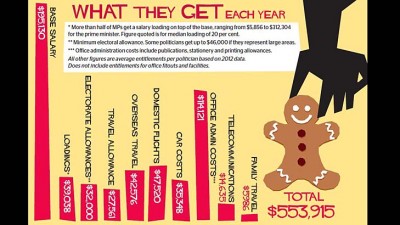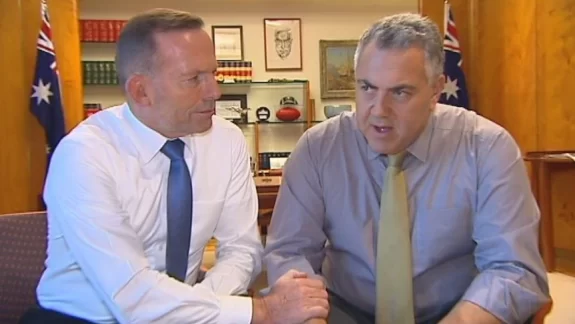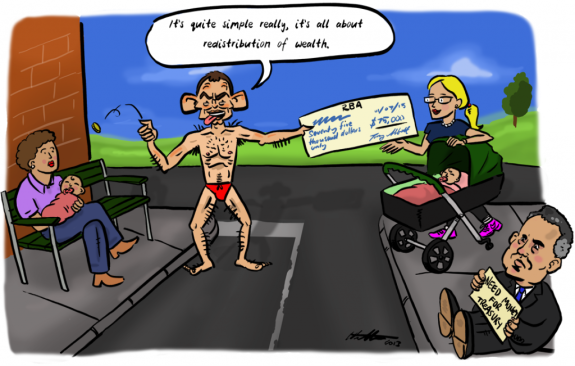STOP THE RORTS

In a time when “Team Australia” is being asked to pull together to fix the “debt and deficit disaster we inherited from Labor,” when we are told “the age of entitlement is over” and “nothing is free,” is it any wonder that people are asking who is on the Team because some of us aren’t doing the hard yards.
In July we heard that Malcolm Turnbull, Australia’s second-richest parliamentarian, has invested in a ”vulture fund” based in the tax haven Cayman Islands. Whilst this is legal, it seems in conflict with the Coalition’s current campaign against corporate tax dodging and the offshoring of profits.
We then heard of how we are paying off Joe Hockey’s investment property in Canberra. Not only does he claim $270 a night to stay in his own home, he has also collected rent from a host of other MPs who have stayed there.
This is not an unusual practice. As reported in the Telegraph:
“The double dipping of MPs who claim travel allowance to stay in properties owned by themselves or their wives and in some cases reduce their tax by negatively gearing property is well-known in Canberra. In 2007, it was revealed Malcolm Turnbull, then regarded as Australia’s richest MP, rented a house from his wife Lucy when in Canberra. It was reported Mr Turnbull paid $10,000 a year to his wife under the arrangement and claimed another $10 a night when she stayed in Canberra.”
This practice of ‘take whatever you can’ is so entrenched that Tony Abbott freely admitted yesterday that the reason he had kept Cabinet waiting for an hour was because he flew to Melbourne the night before for a party (even though it was a sitting day of Parliament) and to justify claiming expenses he had to fit in a photo opportunity the next morning. Tony’s photo shoots cost this nation millions.
When the Greens called for an independent National Integrity Commissioner to oversee entitlements and parliamentary corruption both major parties scurried away.
The Prime Minister dismissed calls for reform of the entitlements system, saying:
”It doesn’t matter what the rules are. There is always going to be an argument at the margins.”
That’s like saying the rorters are always one step in front of the rules.
Shadow Attorney-General Mark Dreyfus said the Department of Finance should investigate politicians’ entitlements across the Parliament, in the wake of the expenses scandals (perhaps before his trip to the snow was noticed). But he did not back the Greens proposal.
“I’m not convinced that there is a need for yet another integrity officer,” he said. “The Auditor General is already able to look at entitlement claims.”
Either the Auditor General is not doing their job very well or, more likely, they need more staff and some political backing.
With the large number of repayments of “incorrectly” claimed entitlements made in recent times, it seems that Tony Abbott and other members of the Federal Parliament may have violated Section 135.3 of the Commonwealth Criminal Code Act (1995) by “obtaining a financial advantage that they were not entitled to receive.”
Section 135.2 is the criminal code most frequently used by Centrelink to prosecute welfare recipients at the rate of 10 or more people PER DAY for wrongly claiming welfare allowances.
Politicians already have most of their bills paid for them – travel, accommodation, petrol, phone, publications, staff and office expenses – they also draw a hefty wage with a generous retirement package that they can access early. The base pay for Joe Hockey is $366,000 a year and Tony Abbott gets $507,000 before all the extras are considered.
Before you ask the rest of us to pay half a packet of cigarettes to go to the doctor, how about you give up buying Havana cigars with money taken from pensioners. Before you cut $44 million from the National Partnership on Homelessness, how about you pay for your own investment properties. Before you hike up the cost of petrol, how about you pay for your own travel and accommodation to go to parties.
STOP THE RORTS!
Like what we do at The AIMN?
You’ll like it even more knowing that your donation will help us to keep up the good fight.
Chuck in a few bucks and see just how far it goes!
Your contribution to help with the running costs of this site will be gratefully accepted.
You can donate through PayPal or credit card via the button below, or donate via bank transfer: BSB: 062500; A/c no: 10495969















